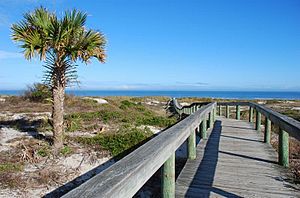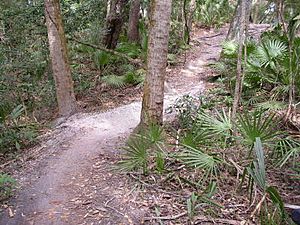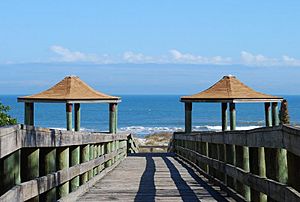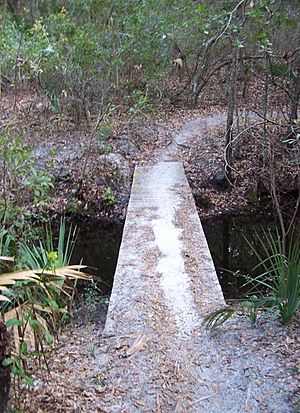Hanna Park facts for kids
Quick facts for kids Hanna Park |
|
|---|---|

Hanna Park boardwalk across dunes
|
|
| Type | Municipal (Parks & Recreation Department) |
| Location | Jacksonville, Florida |
| Area | 447 acres (1.81 km²) (.698 mi²) |
| Created | 1967 |
| Operated by | City of Jacksonville |
| Visitors | 400,000 |
Kathryn Abbey Hanna Park, often called Hanna Park, is a fun public beach and city park in Jacksonville, Florida. It covers about 1.5 miles (2.4 km) of beautiful coastline. You can find it in the Mayport area, which is part of the Jacksonville Beaches. The park has 447 acres (1.81 km²) of old coastal forests, called "hammocks." These special forests are becoming very rare along Florida's busy Atlantic coast.
Contents
Park History
Manhattan Beach: A Special Place
A part of what is now Hanna Park was once called Manhattan Beach. This was Florida's very first beach community created for African Americans. This happened during a time in the United States when people were separated by race, known as segregation in the United States.
Manhattan Beach was meant for African American workers from the Florida East Coast Railway and nearby hotels. People like Mack Wilson and William Middleton, who were African American business owners, helped make Manhattan Beach a popular spot. Many African Americans from across the South came to visit.
At its best, the beach had cool things like picnic areas, small cabins, and even an amusement park! It was a lively place until 1932. That year, the East Coast Railway stopped its train service to northern Mayport. This made it much harder for people to get to the beach. Around 1940, another larger beach called American Beach became more popular.
How the Park Started
In 1967, a man named Winthrop Bancroft gave 5 acres (2.0 ha) of land for the park. He asked that the park be named after Kathryn Abbey Hanna. She was an educator and author born in Chicago. Kathryn Abbey Hanna moved to Florida and helped with the Board of Parks and Historic Memorials.
Kathryn Abbey Hanna taught at Florida State College for Women. She also wrote a history book about Florida called Florida, Land of Change.
Growing the Park
After Jacksonville Consolidation, the area became part of the city of Jacksonville. The city bought more land around the park in the 1970s. This happened when Hans Tanzler was the mayor. This helped the park become much bigger.
The first general trail in the park was built in 1987. A young man named Michael Long created it as his Eagle Scout project. Most of the park's land has been kept in its natural, wooded state. Wooden walkways were built over the sand dunes to protect the plants.
Park Features
Hanna Park offers many fun activities. Besides the beautiful white sand beach on the Atlantic Ocean, you can find:
Off-Road Bike Trails
The park has almost 15 miles (24 km) of bicycle trails. These trails are for off-road biking and range from easy to very difficult. If you are an experienced rider, trails like Grunt, Misery, and Tornado Alley will give you a tough workout. Bike races are held here at different times of the year. Many local cyclists ride these trails every day. These trails are known for being challenging and close to the sea.
Campground Fun
The park has nearly 300 campsites hidden in the woods. These sites are along winding, paved roads. You can use them for tent camping or for RVs. There are also six small log "cozy cabins." These are great for staying overnight, especially in the summer.
Dolphin Plaza
The park has a special building right on the beachfront called Dolphin Plaza. Groups can rent this facility. It offers amazing views of the sand dunes and the ocean waves.
Freshwater Lake Activities
There is a 40-acre (16 ha) freshwater lake in the park. This lake was once a "borrow pit," which is a hole dug to get dirt for road building. It opened in 1978. At the lake, you can go fishing, kayaking, paddle boating, and canoeing. There are picnic tables and grills by the lake. Scenic trails go all around the lake. A water playground is also available for younger children.
Other Cool Things to Do
Hanna Park also has a visitor center where you can learn more about the park. You can play shuffleboard and volleyball. All around the park, you will find benches, grills, picnic shelters, and tables. There is also playground equipment, restrooms, and trash cans for your convenience.
 | Roy Wilkins |
 | John Lewis |
 | Linda Carol Brown |




